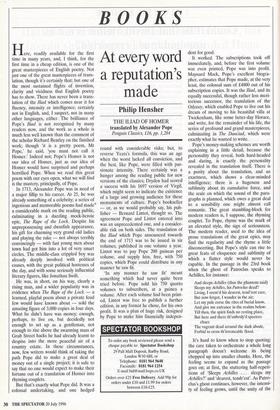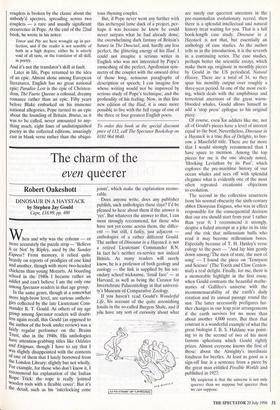BOOKS
At every word a reputation's made
Philip Hensher
THE ILIAD OF HOMER translated by Alexander Pope Penguin Classics, £16, pp. 1,284
Here, readily available for the first time in many years, and, I think, for the first time in a cheap edition, is one of the great masterpieces of English poetry. Not just one of the great masterpieces of trans- lation, though it's certainly that; but one of the most sustained flights of invention, clarity and vividness that English poetry has to show. There has never been a trans- lation of the Iliad which comes near it for fluency, intensity or intelligence; certainly not in English, and, I suspect, not in many other languages, either. The brilliance of Pope's Iliad is not recognised by many readers now, and the work as a whole is much less well known than the comment of the scholar Richard Bentley on the finished work; though 'it is a pretty poem, Mr Pope,' he said, 'you must not call it Homer.' Indeed not; Pope's Homer is not our idea of Homer, just as our idea of Homer would have surprised and perhaps horrified Pope. When we read this great poem with our eyes open, what we will find is the mastery, principally, of Pope.
In 1713, Alexander Pope was in need of a major fillip to his career. At 25, he was already something of a celebrity; a series of ingenious and memorable poems had made' a considerable mark on the reading public, culminating in a dazzling mock-heroic epic, The Rape of the Lock. Despite his unprepossessing and dwarfish appearance, his gift for charming very grand old ladies and playing the rake — not always terribly convincingly — with fast young men about town had got him into a lot of very smart circles. The middle-class crippled boy was already deeply involved with political causes, with the great political hostesses of the day, and with some seriously influential literary figures, like Jonathan Swift.
He was, in short, on his way, clearly a rising man, and a wider popularity was in evidence when The Rape of the Lock — a learned, playful poem about a private feud few would have known about — sold the amazing figure of 3,000 copies in four days. What he didn't have was money; enough, perhaps, to live on, but decidedly not enough to set up as a gentleman, not enough to rise above the swarming mass of Grub Street hacks he had already learnt to despise into the more peaceful air of a country estate. In these circumstances, now, few writers would think of taking the path Pope did to make a great deal of money out of a single project; it is safe to say that no one would expect to make their fortune out of a translation of Homer into rhyming couplets.
But that's exactly what Pope did. It was a colossal undertaking, and one hedged
round with considerable risks; but, to reverse Yeats's formula, this was an age when the worst lacked all conviction, and the best, like Pope, were filled with pas- sionate intensity. There certainly was a hunger among the reading public for new versions of the classics; Dryden had scored a success with his 1697 version of Virgil, which might seem to indicate the existence of a large and growing audience for these monuments of culture. Pope's bookseller — or, as we would probably say, his pub- lisher — Bernard Lintot, thought so. The agreement Pope and Lintot entered into was an unprecedented one, and a consider- able risk on both sides. The translation of the Iliad which Pope announced towards the end of 1713 was to be issued in six volumes, published in one volume a year. Lintot was to pay Pope 200 guineas per volume, and supply him, free, with 750 copies, which Pope could distribute in any manner he saw fit.
'In any manner he saw fit' meant something which had never quite been tried before. Pope sold his 750 quarto volumes to subscribers, at a guinea a volume. After each volume had been print- ed, Lintot was free to publish a further edition, in any format he chose, for his own profit. It was a plan of huge risk, designed by Pope to make him financially indepen- dent for good.
It worked. The subscriptions took off immediately, and, before the first volume was even printed, Pope was into profit. Maynard Mack, Pope's excellent biogra- pher, estimates that Pope made, at the very least, the colossal sum of £4000 out of his subscription copies. It was the Iliad, and its equally successful, though rather less meri- torious successor, the translation of the Odyssey, which enabled Pope to live out his dream of moving to his beautiful villa at Twickenham, like some latter-day Horace, and write, for the remainder of his life, the series of profound and grand masterpieces, culminating in The Dunciad, which were exactly what he wanted to write.
Pope's money-making schemes are worth explaining in a little detail, because the personality they reveal, both hard-headed and daring, is exactly the personality revealed in the translation itself. There is a purity about the translation, and an exactness, which shows a clear-minded intelligence; there is a hugeness and sublimity about its cumulative force, and the scale on which the sound of the para- graphs is planned, which owes a great deal to a sensibility one might almost call romantic. The great stumbling-block for modern readers is, I suppose, the rhyming couplet. To Pope, rhyme was the mark of an elevated style, the sign of seriousness. The modern reader, used to the idea of prose translations of the great epics, may find the regularity and the rhyme a little disconcerting. But Pope's style can rise to great feats of eloquence and sublimity of which a flatter style would never be capable. In the passage in the 23rd book when the ghost of Patroclus speaks to Achilles, for instance:
And sleeps Achilles (thus the phantom said) Sleeps my Achilles, his Patroclus dead? Living, I seem'd his dearest, tend'rest care, But now forgot, I wander in the air; Let my pale corse the rites of burial know, And give me entrance in the realms below: Till then, the spirit finds no resting place, But here and there th'unbody'd spectres
chace The vagrant dead around the dark abode, Forbid to cross th'irremeable flood.
It's hard to know when to stop quoting; the care taken to orchestrate a whole long paragraph doesn't welcome its being chopped up into smaller chunks. Here, the feeling seems to expand as the passage goes on; at first, the stuttering half-repeti- tions of 'Sleeps Achilles . . . sleeps my Achilles?' and 'dearest, tendr'est'. As Patro- clus's ghost continues, however, the intensi- ty of feeling grows, until the unity of the
couplets is broken by the clause about the unbody'd spectres, spreading across two couplets — a rare and usually significant occurrence in Pope. At the end of the 22nd book, he wrote in his notes:
Tenor and Pity are here wrought up in per- fection, and if the reader is not sensible of both in a high degree, either he is utterly void of all taste, or the translator of all skill, in poetry.
And it's not the translator's skill at fault.
Later in life, Pope returned to the idea of an epic. Almost alone among European literatures, English has no great national epic; Paradise Lost is the epic of Christen- dom, The Faerie Queene a colossal, dreamy romance rather than an epic. Fifty years before Blake embarked on his immense national allegories, Pope turned to an epic about the founding of Britain. Brutus, as it was to be called, never amounted to any- thing much, eight lines of undistinguished poetry in the collected editions, amazingly cast in blank verse rather than the ubiqui- tous rhyming couplet.
But, if Pope never went any further with this archetypal lame duck of a project, per- haps it was because he knew he could never surpass what he had already done; the overwhelming dark fantasy of Britain's future in The Dunciad, and, hardly any less perfect, the glittering energy of his Iliad. I could not imagine a serious writer in English who was not interested by Pope's enmeshing of the perfect, Apollonian sym- metry of the couplet with the onward drive of those long, sensuous paragraphs of description or speech; I can imagine few whose writing would not be improved by serious study of Pope's technique, and the profundity of his feeling. Now, in this fine new edition of the Iliad, it is once more possible to live with the full range of one of the three or four greatest English poets.
To order this book at the special discount price of £12, call The Spectator Bookshop on 0181 964 9640.



























































 Previous page
Previous page